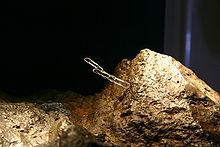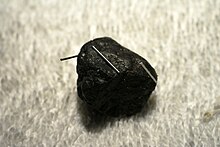
Back حجر المغناطيس Arabic লোডস্টোন Bengali/Bangla Caramida Catalan Ngék-tiék-siŏh CDO Bato-balani CEB Piedra de imán Spanish سنگ آهنربا Persian Seguljárnsteinn Icelandic Zeilsteen Dutch Lodestone NN



Lodestones are naturally magnetized pieces of the mineral magnetite.[1][2] They are naturally occurring magnets, which can attract iron. The property of magnetism was first discovered in antiquity through lodestones.[3] Pieces of lodestone, suspended so they could turn, were the first magnetic compasses,[3][4][5][6] and their importance to early navigation is indicated by the name lodestone, which in Middle English means "course stone" or "leading stone",[7] from the now-obsolete meaning of lode as "journey, way".[8]
Lodestone is one of only a very few minerals that is found naturally magnetized.[1] Magnetite is black or brownish-black, with a metallic luster, a Mohs hardness of 5.5–6.5 and a black streak.
- ^ a b Hurlbut, Cornelius Searle; W. Edwin Sharp; Edward Salisbury Dana (1998). Dana's minerals and how to study them. John Wiley and Sons. pp. 96. ISBN 0-471-15677-9.
- ^ Bowles, J. F. W.; R. A. Howie; D. J. Vaughan; J. Zussman (2011). Rock-forming Minerals: Non-silicates: oxides, hydroxides and sulphides, Volume 5A, 2nd Ed. UK: Geological Society of London. p. 403. ISBN 978-1862393158.
- ^ a b Du Trémolet de Lacheisserie, Étienne; Damien Gignoux; Michel Schlenker (2005). Magnetism: Fundamentals. Springer. pp. 3–6. ISBN 0-387-22967-1.
- ^ Dill, J. Gregory (Jan–Feb 2003). "Lodestone and Needle: The rise of the magnetic compass". Ocean Navigator online. Navigator Publishing. Retrieved 2011-10-01.
- ^ Merrill, Ronald T.; Michael W. McElhinny; Phillip L. McFadden (1998). The Magnetic Field of the Earth. Academic Press. p. 3. ISBN 0-12-491246-X.
- ^ Needham, Joseph; Colin A. Ronan (1986). The Shorter Science and Civilization in China. UK: Cambridge Univ. Press. pp. 6, 18. ISBN 0-521-31560-3.
- ^ "Lodestone". Merriam-Webster online dictionary. Merriam-Webster, Inc. 2009. Retrieved 2009-06-12.
- ^ "lodestone". Oxford English Dictionary (Online ed.). Oxford University Press. (Subscription or participating institution membership required.): 'Literally 'way-stone', from the use of the magnet in guiding mariners.'